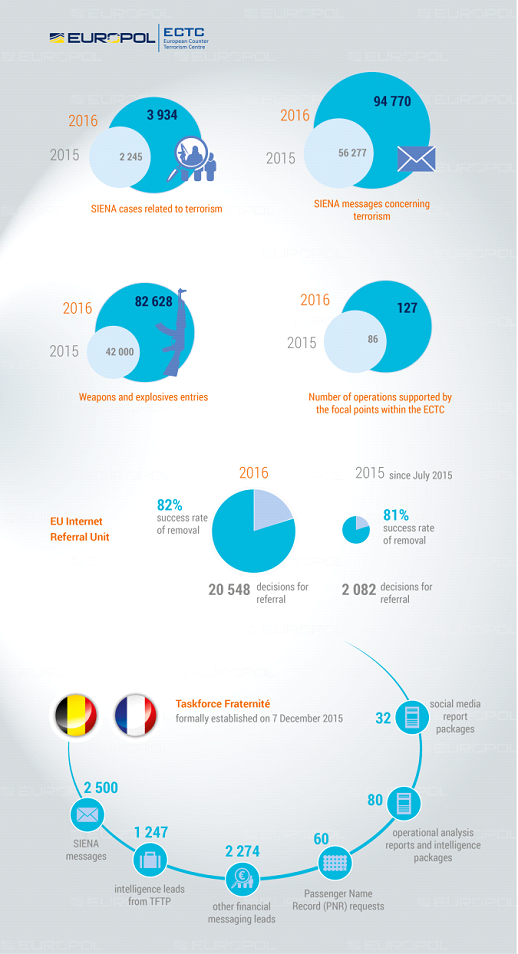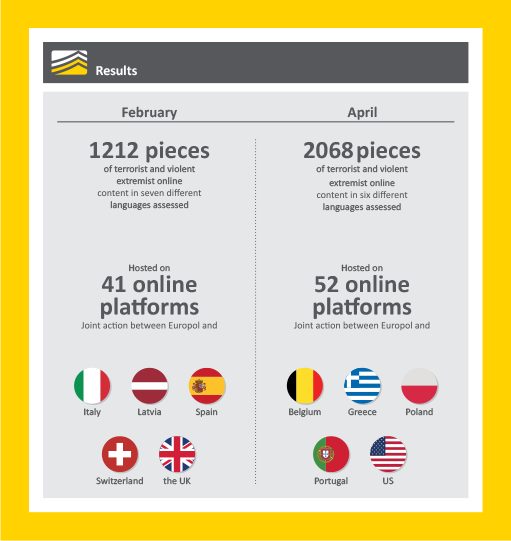Europe is faced with a mix of terrorist threats which cannot be dealt by the EU Member States alone. International cooperation is needed. Europol’s European Counter Terrorism Centre (ECTC) serves as a centre of expertise, focusing on tackling foreign fighters, sharing intelligence and expertise on terrorism financing, online terrorist propaganda and extremism, illegal arms trafficking and international cooperation to increase effectiveness and prevention. ECTC provides the Member States and its key partners with new possibilities to ensure the most effective management of counter terrorism intelligence. ECTC is the single point in the EU where counter terrorism (CT) operational information from law enforcement services in the European Union Member States and third parties is brought together for analytical purposes. To give an example, the dedicated database of foreign terrorist fighters contains 5990 suspects.
Specialised teams of Europol CT analysts and experts work on this information to provide leads, cross-check live operational data with the already available data at Europol, and compile a structured picture of terrorist networks. This was the case in the aftermath of the attacks that took place in Paris in November 2015 and in Brussels in March 2016, when Europol assisted French and Belgian authorities in their high-profile operations. Europol mobile offices were deployed to Belgium, France and Interpol. Task force Fraternité was established at Europol to support these investigations, facilitate international information exchange and to conduct analysis on the data communicated by all concerned Member States and third parties. More than 18 TB of data was received for this case, and Europol produced more than 80 analysis reports.
To facilitate and increase the speed of information exchange, Europol developed specialised tools within its SIENA environment.



The EU-US Terrorist Finance Tracking Programme (TFTP) agreement has continually proven to be a valuable tool in terrorism-related investigations. It enhances the ability to map out terrorist networks, often filling in missing links in an investigative chain. It is used to track terrorist money flows, allowing authorities to identify and locate operatives and their financiers, and assists in broader efforts to uncover terrorist cells. While the TFTP is based on queries linked to terrorism and terrorist financing, the generated leads enrich the overall intelligence picture, including the opportunity to identify new lines of inquiry (initially not related to counter terrorism).
Finance to support terrorists is found in many guises; 2016 has seen the movement of smaller sums moved regularly through the financial sector. These low value payments sent by supporters and family members are transferred to support foreign terrorist fighters (FTFs) and their organisational expenses. Lesser value financial transactions must similarly provoke Suspicious Transaction Reporting (STRs) from the financial sector and are key indicators to support CT investigations. Lesser value financial transaction intelligence also proves evidentially important in obtaining judicial support regarding search warrants and arrests.
2016 again highlighted the benefit of financial intelligence to EU counter terrorism investigations. 35 TFTP requests were made just in support of Operation Fraternité, generating 1180 leads. Requests were also made to retrieve financial information from money service bureaus. From January to December 2016, 122 Article 10 TFTP requests were submitted by Europol to the US, generating a total of over 21 720 intelligence leads, which were passed to EU Member States. Of these TFTP requests, 65 concerned foreign terrorist fighters (FTFs), generating 14 548 intelligence leads.